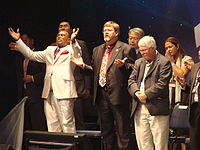
Photo from wikipedia
Praying for others in the wake of a disasters is a common interpersonal and public response to tragedy in the United States. But these gestures are controversial. In a survey… Click to show full abstract
Praying for others in the wake of a disasters is a common interpersonal and public response to tragedy in the United States. But these gestures are controversial. In a survey experiment, we elicit how people value receiving a prayer from a Christian stranger in support of a recent hardship and examine factors that affect the value of the prayer. We find that people who positively value receiving the prayer do so primarily because they believe it provides emotional support and will be answered by God. Many also value the prayer because they believe it will improve their health and wealth, although empirical support of such effects is lacking. People who negatively value receiving the prayer do so primarily because they believe praying is a waste of time. The negative value is particularly large if people are offended by religion. Finally, the hardship experienced by the prayer recipient matters to the intensity by which recipients like or dislike the gesture, suggesting the benefit of prayers varies not only across people, but also across contexts.
Journal Title: PLoS ONE
Year Published: 2022
Link to full text (if available)
Share on Social Media: Sign Up to like & get
recommendations!